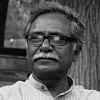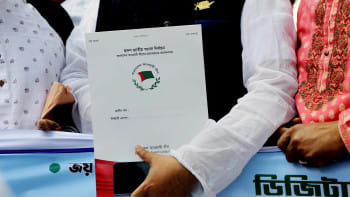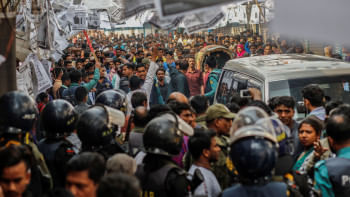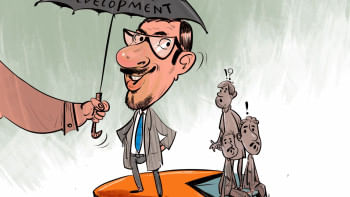Nothing is normal if we don’t have our rights

In 2023, uncontrolled inflation, rising inequality, a political deadlock, repression, and structural killings of various kinds were prevalent. However, during this year, the movement for a free and fair election under a caretaker government also gained momentum. Leading up to October 28, 2023, the processions and gatherings increased in number and frequency. Several political parties and alliances besides BNP were also active in this movement.
The government, to combat this, worked in a very planned and organised manner throughout the year. Whenever BNP wanted to hold a rally, Awami League announced a counter rally for the same date. But despite many obstacles, these marches and rallies were held peacefully, for the most part. However, the peaceful aspect of the situation ended on October 28 last year.
Although we are used to the ruling party saying one thing and doing the opposite, the party's general secretary did make one very true statement. Obaidul Quader has repeatedly said, "Khela hobe."
The game's first phase was for BNP to hold a rally, and for Awami League to hold a rally to counter it. The second phase which is currently playing out is a one-sided election, fuelled by violence. After the fateful October 28, the repression of opposition activists and leaders intensified.
A torched bus was met by fire on a train—repression on one side was used to justify repression on the other. The latest gruesome incident of this phenomenon is the burning of a train, killing four, including a mother and her three-year-old child. BNP says the government did it, the government says BNP did it. We can only know who really did it if the inquiry committee does its job properly. For as long as the committee is not independent and reliable, we will remain in the dark.
The election this time is practically an extension of the one held in 2014. The 2014 model was of a one-sided election in the absence of a major challenger. While a party needs to acquire 151 seats to win the election, Awami League was elected unopposed to 153 seats that year. Meaning that there was no real election. Meanwhile, the 2018 model involved the participation of a main competitor, but the whole process (including the polling stations) was occupied by the ruling party, and the ballot boxes were stuffed the night before. This year, the government was on its feet to employ both these models. Since BNP and alliances refused to participate under the ruling government, the 2014 model seems more relevant. However, the difference this year is that the government needs to bring voters to the polling booths and create enthusiasm to gain the acceptance of national and international quarters. This is why independent candidates are being fielded and encouraged, and dummy candidates are being placed. The ruling party has managed to stuff everyone into its box by clipping their backbones.
Awami League claims that it was elected to power. But everyone knows this is not right. After 2008, there has been no credible election in Bangladesh. The ruling party also claims zero tolerance for corruption, when in fact corruption has increased at unprecedented levels over the last 15 years. They claim that they protect the environment, but the extent to which rivers have been encroached and polluted, and the way forests have been destroyed during this party's tenure is unprecedented. We also cannot hope for anything better in 2024 if this regime continues to be unaccountable. In 2023, looting and smuggling of financial resources reached new heights.
Those who are making money fast by defaulting on bank loans, grabbing rivers and land, and signing more expensive projects also fear transparency and accountability. So, they show their love and support for an authoritarian regime. After all, if there was any accountability, thousands of crores could not have been looted from Bangladesh's energy and financial sectors.
Meanwhile, structural killings are another issue that persists. Deaths on roads continue because of institutional failure, as no attempts have been taken to fix the issues that contribute to frequent road crashes.
The year 2023 also saw the worst outbreak of dengue and the highest number of resulting deaths, by far, in the country's history. Still, we did not see any proactive or focused actions from the government to counter this.
Workers in the ready-made garments sector rallied for fair wages, but instead of trying to reach reasonable settlement with them, the government resorted to violent means. Four workers, including a female one, were killed during the recent minimum wage protests, while police cases were also filed against many workers. Hundreds of workers are still in jail without trial or bail.
In another part of the country, in the hill tracts, violence is rampant as four young organisers were killed quite recently.
For none of the irregularities and government's failure do people expect any justice. And things are not going to change in the new year. If anything, they may worsen.
Institutions are either made practically non-functional or only functional as a ruling party organ. The Election Commission, National Human Rights Commission, Anti-Corruption Commission, and the legal system are supposed to stand as last resort for people. The responsibility of these institutions is to correct or challenge the mistakes of the government. People look to these institutions to receive remedies for the wrongdoings of the government. But it is no exaggeration to say that none of these institutions bears any credibility any more.
A university is a country's most important centre for education, research, free thinking, and for questioning injustice. But even universities have lost their backbones as the regime has ensured that persons loyal and subservient to it are allowed in public universities' administrations, while musclemen from student bodies are employed to make sure that there is no dissent, that the teachers are loyal, and that the students in the halls are not protesting anything at all.
Can we reasonably expect these things to change for the better if the upcoming election is held with the previous election as a model?
Despite the silence of a large section of the intelligentsia, young groups of writers, artists, journalists, and teachers have held meetings for democratic rights. But on the whole, the ruling party's scheme of perpetuating its autocratic system of government has been far more successful. We saw too many unnatural, premature deaths (be it from dengue, road crashes, murders, sexual assault, or in police custody) in 2023. If this continues, I cannot harbour false optimism and have to say that 2024 will be even more difficult for the general people.
To put an end to rampant authoritarianism, we have to have our rights—democratic rights, the right to question, our rights as citizens. Life cannot be considered normal unless these rights are established. And when a population's life isn't normal, its death cannot be anything different either.
Translated from Bangla by Monorom Polok.
Anu Muhammad is former professor of economics at Jahangirnagar University.
Views expressed in this article are the author's own.
Follow The Daily Star Opinion on Facebook for the latest opinions, commentaries and analyses by experts and professionals. To contribute your article or letter to The Daily Star Opinion, see our guidelines for submission.

 For all latest news, follow The Daily Star's Google News channel.
For all latest news, follow The Daily Star's Google News channel. 







Comments